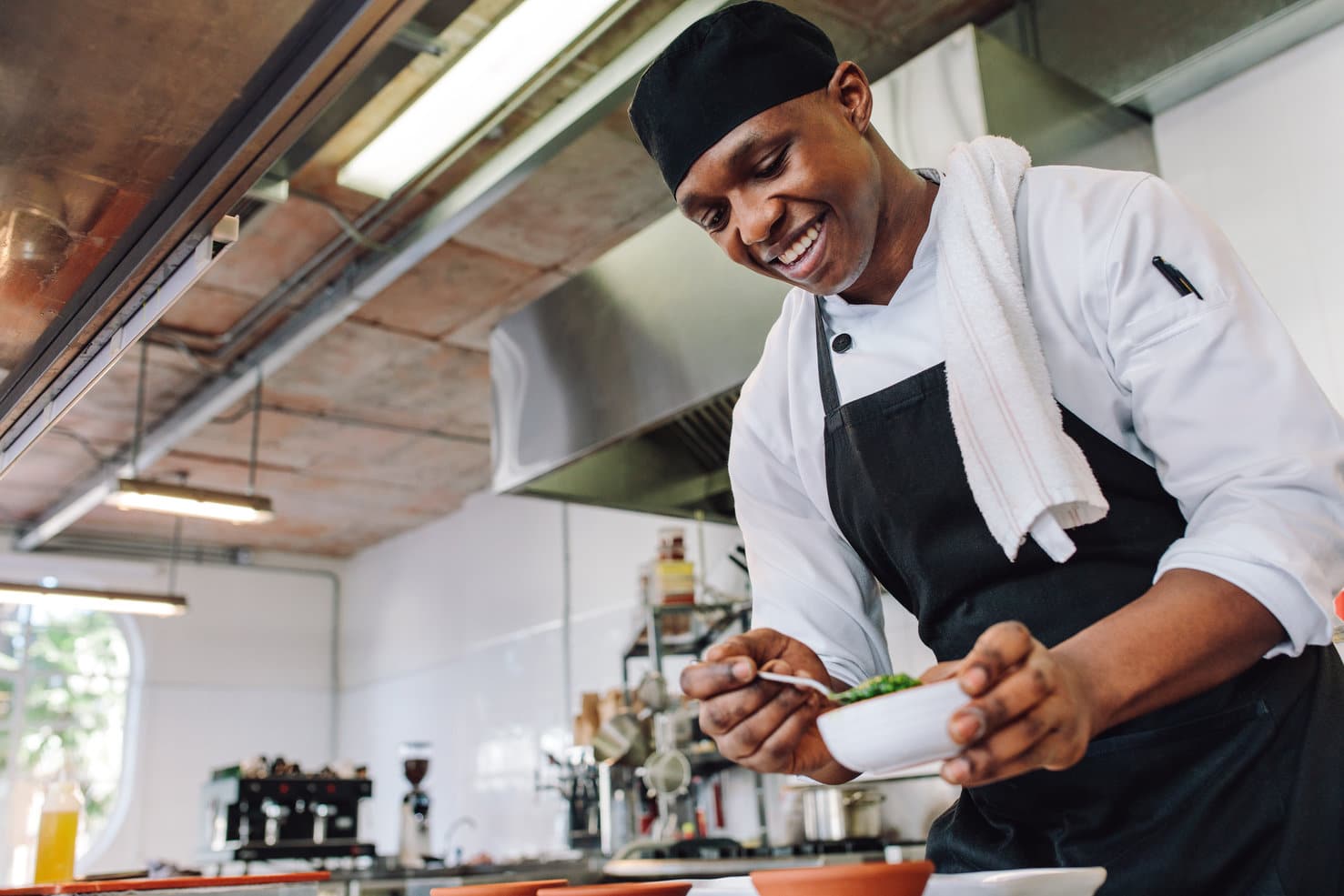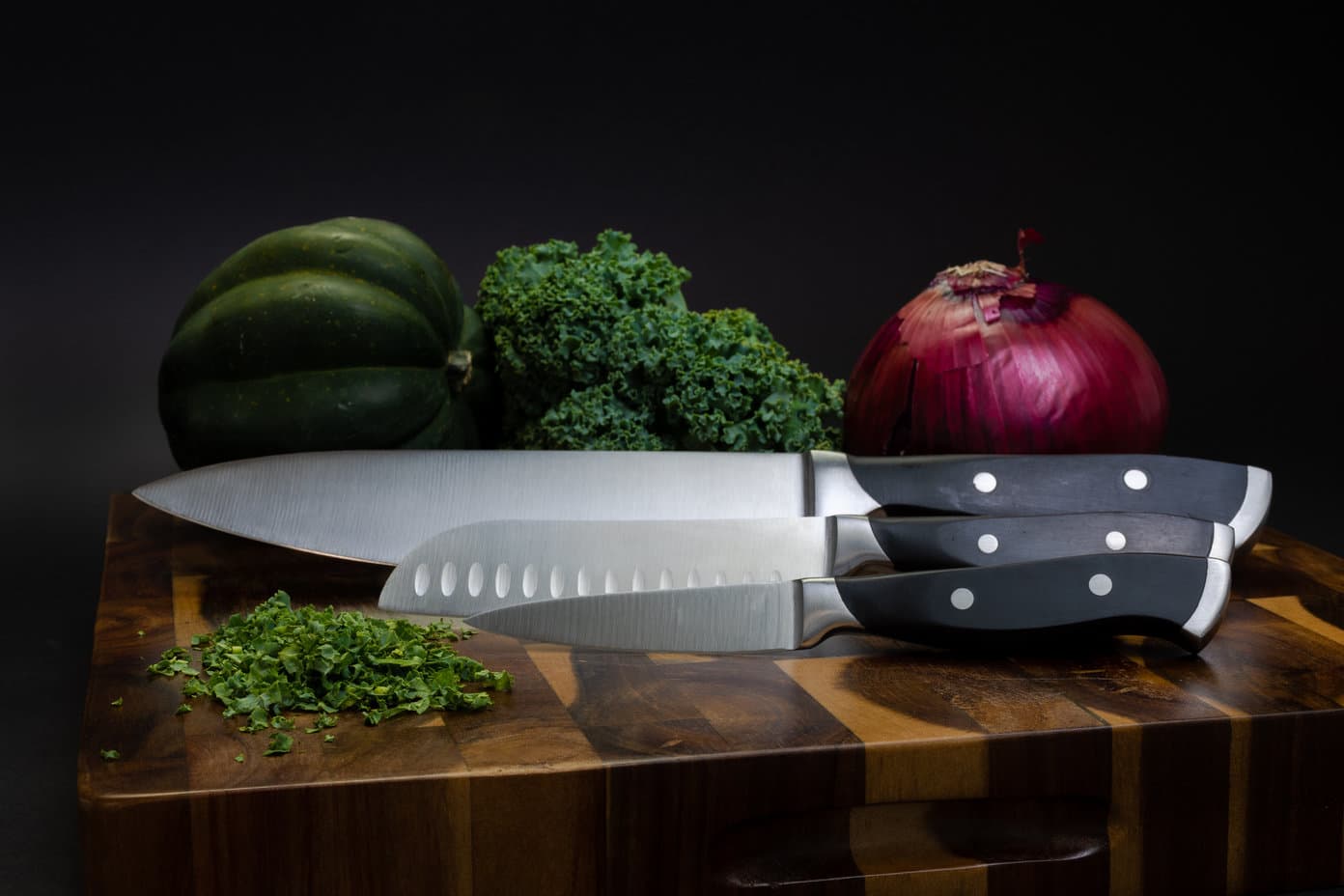Jasmine Birtles
Your money-making expert. Financial journalist, TV and radio personality.


Ever wondered if you should become a chef? If lockdown has taught us anything, it’s that some of us were born to cook and some of us…well, aren’t. If you’ve discovered surprise culinary skills and want a career change, perhaps it’s time to consider a career in the kitchen!
For anyone with a passion for food, a life as a chef is a demanding yet rewarding one. Let’s look at how you can take your foodie skills to the next level to become a chef.
There are many levels of chef in a commercial kitchen, whether that’s for a restaurant, hotel, or events venue. If you’re just starting out, expect to work your way up from the bottom – the main way to get ahead in a catering role is to prove yourself with hard work.
From the lowest to highest rank in the kitchen, it goes:
Not every place has an executive chef – you’ll find them in companies with several restaurants or hotels.
So, you can see how you need to work your way up as you learn the skills!
Your average salary when you are starting out will be somewhere between £18,000 and £19,500. An executive chef makes somewhere between £50,000 and £70,000 depending on experience and the company. So, this career is not the one for you if you are purely focused on the money you earn!
Of course, if you decide to go it alone when you’ve reached Head Chef status, there’s always th
e opportunity of becoming the next TV chef that earns millions… we can all dream!

It’s hard to say exactly what a typical day is like, as it changes depending on the type of kitchen you’re working in. For example, if you’re working in a local cafe that opens 9am to 6pm, you could be working 7am to 8pm (or shifts around those times). But, if you’re working for an events venue, your shift might start at 11am and finish at 1am. It’s very varied!
You’ll work shifts and often split shifts. That means you’ll work a full day around 14 hours, but get a slightly longer break in the middle of the day. It’s mentally and physically demanding work, and you’ll get little spare time (especially when you’re still learning). You may find your social life suffers – but if you can negotiate an hourly pay (instead of a monthly salary), this could mean you earn more! If you like going out in the evenings or at weekends, it’s probably not the job for you. There’s a reason a large proportion of men on Tinder are chefs – it’s the most viable way for them to meet a partner, because of the odd hours they work!
However, there is a special camaraderie amongst chefs that many find is the most enjoyable part of the job. You get to know your team very quickly, as you’re in a busy kitchen with each other five days a week – and it’s important you work well together as a machine. This tight friendship and understanding of the difficulties of the job is why many people have long careers as chefs.
The biggest thing in finding a job these days is you need qualifications or “a minimum of two years’ experience” for an entry level job. It feels impossible to actually begin a career these days!
That’s where kitchen work is different. Do you need qualifications? No! For the most part, chefs looking for a new commis will usually prefer someone completely green. This is because you pick up habits as a chef very quickly. Lots of them are completely inconsequential, but in a kitchen, everyone needs to work with perfect synergy. If everyone is not on the same wavelength then it can make work very difficult.
Some kitchens may ask you if you have any qualifications, however. This is mainly because, in gaining your qualifications you will also have to do your food hygiene course which is imperative to working professionally. Don’t worry if you haven’t done it though: it’s required by law before you can work in the kitchen, so they’ll train you for it.
You can get qualifications if you want to, however. If you’ve never set foot in a professional kitchen then this is a great way to gain some valuable experience.
We all know how to make a white sauce for a lasagne or cheesy pasta, and could do it in our sleep in our kitchens at home. But being told to go and make a roux and turn it into a bechamel, in a loud, bustling kitchen may confuse and startle you!
Professional cookery courses are usually run in a working hotel rather than in a college building, too. This means that as part of your learning you will be expected to work a service, cooking for paying customers during your time learning. College is a good way to gain knowledge, but there is a major difference between cooking in a controlled environment like a college and working in a fast-paced professional kitchen.

You will have seen chefs on TV who have six or seven different knives in front of them, but are they necessary? Yes, to that chef, they probably are!
That doesn’t mean that you need to run out and buy them all yourself when you begin your culinary career though. Every chef has a favourite knife, one that is comfortable to hold for a long time and is the right length. More expensive does not necessarily mean better when it comes to knives. Don’t try to buy a set of 6 knives for a fiver, but the difference between a £30 knife and a £100 knife is minimal and comes down to personal preference.
A good beginners knife case will contain:
A paring knife is small, usually 7 – 11cm long, and used for peeling fruit and veg and other small intricate work such as de-veining prawns, removing seeds or preparing garnish
About the same size as a paring knife, it has serrated teeth perfect for cutting soft flesh fruits and veg without damaging or bruising the flesh.
This is a big serrated knife around 25cm long. Cutting pastry can be tough as it is so delicate so the pastry knife is used in the same way as a tomato knife, but for bigger jobs.
This is the most common knife you’ll see in a kitchen. It is what comes to your head when you think of a knife. Usually around 20cm long and heftier as it is used to cut through tough pieces of meat and vegetables. It is the most versatile knife around.
Filleting knives are different from the rest because their blades are purposefully bendy! This is because they are used for the difficult jobs such as completely taking the flesh from a whole fish and taking the skin off while keeping it in one piece.
There are other things you will want to have for yourself too. Chefs get very territorial over their possessions, so having your own peeler, corer, micro-plane (grater) etc, is detrimental. But the most important thing you will need to have is a constant supply of pens! You can never have enough pens, be that biros or sharpies, you will do well to remember that.
You’ll also benefit from investing in some comfortable shoes suitable for standing up in a kitchen for long hours. Many chefs swear by Crocs! They’re comfortable and wipe-clean if you spill things on them. Also, get a couple of white t-shirts to wear under your kitchen whites (that’s your chef’s jacket). You’ll get very hot and sweaty in the kitchen, so make sure you have enough t-shirts to ‘wash and wear’ – you’ll want to wear a new one each day.
Interviews for a job in a kitchen are different to many other professions. You can’t just show a picture of something you’ve done before and expect them to be impressed. You have to prove yourself, too.
A sit-down interview will take place, but they will mainly be used to figure out if you know what you are talking about or if you’re trying to blag your way through. Then comes the practical portion of the interview. Always bring your knives, your kitchen clogs and a set of chef whites you feel comfortable in. The job may say it provides a uniform, but only if/when you get the job.
When you get into the kitchen for your practical interview, this is your time to shine. The Head Chef interviewing you sets you a couple of jobs to do in a time limit to show your basic skills. Vegetable prep, basic sauces, etc. This helps them gauge your passion, skill, cleanliness and how you work on your own or with a team.
If you aren’t sure about something you’ve been asked to do, then just ask! It won’t go against you: it’s far more imperative you do the jobs correctly. In some situations, they may want to test your creativity by asking you to make them a dish. You will be told what you can use from the ingredients in the kitchen and given a time limit. You don’t want to waste too much time thinking about this, so have some ideas in your head before you go in. Choose something to show off your skills, as basic as they may be. Don’t over exert yourself though, it is better to get something on a plate that is basic, but tastes good, than to worry and present something you are not happy with.
Always remember the most important thing though: season everything!
Do you want to become a chef after reading this? If you’re still not sure, read these articles for other job ideas to kickstart your career!

very nice and good to look at
From experience, it can be very hard work but ultimately rewarding. Good article.